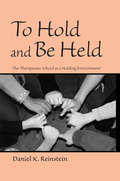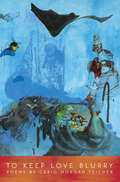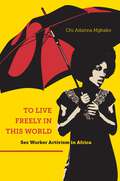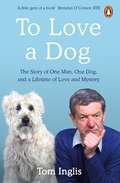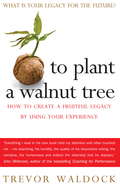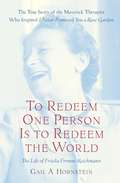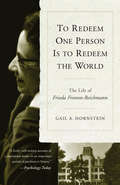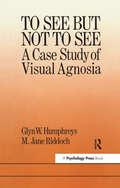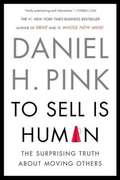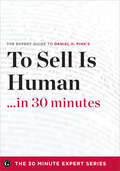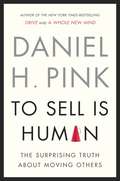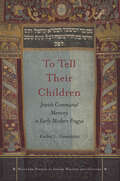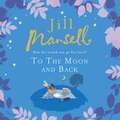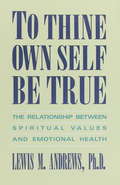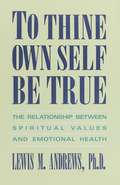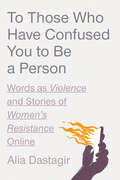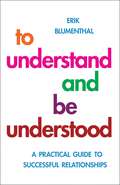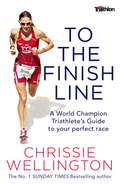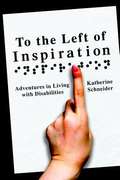- Table View
- List View
To Hold and Be Held: The Therapeutic School as a Holding Environment
by Daniel K. ReinsteinDrawing on the teachings of D.W. Winnicott and John Bowlby, who helped revolutionize thinking about relational psychology, To Hold and Be Held integrates the concepts of the ‘holding environment’ and attachment theory and describes how they are applied in a clinical setting. It also uses metaphor to both derive meaning from the language of the therapeutic process and to apply that meaning within a systems framework to effect significant therapeutic change. As the number of children with complex problems increases and the facilities to treat and manage them decrease, schools are left with few resources to cope. Professionals such as teachers, psychologists, social workers, and counselors need a new framework in which to think about and advocate for services for these children. To Hold and Be Held describes the creation of a system of working that not only holds the child and his family, but also holds the larger system as well – a system in which therapeutic services are integrated at all levels and implemented in public schools in a way that supports all those involved. This is not only a unique and successful way of working with children and their families, but a timely one as well.
To Keep Love Blurry
by Craig Morgan TeicherTo Keep Love Blurry is about the charged and troubled spaces between intimately connected people: husbands and wives, parents and children, writers and readers. These poems include sonnets, villanelles, and long poems, as well as two poetic prose pieces, tracing how a son becomes a husband and then a father. Robert Lowell is a constant figure throughout the book, which borrows its four-part structure from that poet's seminal Life Studies. Craig Morgan Teicher won the Colorado Prize for Poetry. He is poetry reviews editor for Publishers Weekly magazine and served as vice president on the board of the National Book Critics Circle.
To Keep Love Blurry (American Poets Continuum #135.00)
by Craig Morgan TeicherTo Keep Love Blurry is about the charged and troubled spaces between intimately connected people: husbands and wives, parents and children, writers and readers. These poems include sonnets, villanelles, and long poems, as well as two poetic prose pieces, tracing how a son becomes a husband and then a father. Robert Lowell is a constant figure throughout the book, which borrows its four-part structure from that poet's seminal Life Studies. Craig Morgan Teicher won the Colorado Prize for Poetry. He is poetry reviews editor for Publishers Weekly magazine and served as vice president on the board of the National Book Critics Circle.
To Live Freely in This World: Sex Worker Activism in Africa
by Chi Adanna MgbakoSex worker activists throughout Africa are demanding an end to the criminalization of sex work and the recognition of their human rights to safe working conditions, health and justice services, and lives free from violence and discrimination. To Live Freely in This World is the first book to tell the story of the brave activists at the beating heart of the sex workers’ rights movement in Africa—the newest and most vibrant face of the global sex workers’ rights struggle. African sex worker activists are proving that communities facing human rights abuses are not bereft of agency. They’re challenging politicians, religious fundamentalists, and anti-prostitution advocates; confronting the multiple stigmas that affect the diverse members of their communities; engaging in intersectional movement building with similarly marginalized groups; and participating in the larger global sex workers’ rights struggle in order to determine their social and political fate.By locating this counter-narrative in Africa, To Live Freely in This World challenges disempowering and one-dimensional depictions of “degraded Third World prostitutes” and helps fill what has been a gaping hole in feminist scholarship regarding sex work in the African context. Based on original fieldwork in seven African countries, including Botswana, Kenya, Mauritius, Namibia, Nigeria, South Africa, and Uganda, Chi Adanna Mgbako draws on extensive interviews with over 160 African female and male (cisgender and transgender) sex worker activists, and weaves their voices and experiences into a fascinating, richly-detailed, and powerful examination of the history and continuing activism of this young movement.
To Love a Dog: The Story of One Man, One Dog, and a Lifetime of Love and Mystery
by Tom Inglis'A little gem of a book' Brendan O'ConnorTom Inglis and his Wheaten terrier Pepe have lived together for eighteen years: countless days of walks and play and the odd bit of chaos. Now, though, they are both getting old. To Love a Dog tells the story of Tom's life with Pepe, and looks at the ancient connection between humans and dogs. It explores why we take on the hassle of caring for these pet animals who rely on us so completely, who can create mess and upset in our lives, and who will probably die before us, leaving us behind to grieve. This is a book for everyone who has ever loved a dog.
To Plant A Walnut Tree
by Trevor WaldockLeaders in all stages of life will find To Plant a Walnut Tree to be a guide for sharing wisdom in a practical way. Creating a legacy can be in the thoughts of twenty-somethings and soon-to-be retirees alike; author Trevor Waldock suggests that readers "plant walnut trees," or sew small investments for future generations.
To Pray as a Jew: A Guide to the Prayer Book and the Synagogue Service
by Hayim H. DoninA distinguished guide to Jewish prayerWhy do Jews pray? What is the role of prayer in their lives as moral and ethical beings? From the simplest details of how to comport oneself on entering a synagogue to the most profound and moving comments on the prayers themselves, Rabbi Hayim Halevy Donin guides readers of To Pray as a Jew through the entire prescribed course of Jewish liturgy, passage by passage, ritual by ritual, in this handsome and indispensable guide to Jewish prayer. Unexcelled for beginners as well as the religiously observant, To Pray as a Jew is intended to show the way, to enlighten, and hopefully to inspire.
To Redeem One Person Is to Redeem the World: The Life of Frieda Fromm-Reichmann
by Gail A. HornsteinIn this marvelously researched and moving biography closely grounded in Frieda Fromm-Reichmann's work, Gail Hornstein brings back to life the maverick psychiatrist who accomplished what Freud and almost everyone else thought impossible: successfully treating schizophrenics and other seriously disturbed mental patients with intensive psychotherapy, not lobotomy, shock treatment, or drugs. To Redeem One Person Is to Redeem the World tells the extraordinary life story of the German-Jewish refugee analyst, who was the first wife of Erich Fromm. Written with unprecedented access to a rich archive of Frieda Fromm-Reichmann's clinical work at the legendary Chestnut Lodge Hospital in Rockville, Maryland, and using newly discovered family records and documents from across Europe and the United States, this is the definitive biography of a remarkable woman. Best known to millions as the courageous therapist inI Never Promised You a Rose Garden, Joanne Greenberg's bestselling chronicle of madness and recovery, Fromm-Reichmann (1889-1957) is a fascinating and controversial figure in twentieth-century psychiatry. To Redeem One Person Is to Redeem the World traces the story of her life and education, from a loving childhood as the eldest of three daughters in an Orthodox Jewish family to medical school at seventeen, as one of the first women admitted to study at a Prussian university. During World War I, Fromm-Reichmann took charge of a military hospital in Königsberg, transforming it into a pioneering center for the treatment of brain injury. By her mid-thirties, she had opened her own psychiatric sanitarium in Heidelberg, where she and her staff put into practice a unique and hopeful integration of psychotherapy and tikkun,the Jewish ethical principle that every person is worth saving. At thirty-six, she had an affair with and then married her patient, Erich Fromm, later the celebrated author of Escape from Freedom, The Art of Loving, and other psychological classics. Her close friends and colleagues in pre-World War II Germany included some of the most visionary intellectuals and therapists of the era: Martin Buber, Karen Horney, Franz Rosenzweig, Gershom Scholem, and Georg Groddeck, among others. Hornstein recounts Fromm-Reichmann's dramatic escape from Nazi Germany, exile in France and Palestine, and her flight to the United States, where she found asylum at a tiny hospital outside Washington, D.C. Over the following decades, Fromm-Reichmann would emerge as the most distinguished figure at Chestnut Lodge, a mental hospital unlike any other -- intellectually radical, yet filled with warm family feeling and deeply respectful of individual difference. Fromm-Reichmann was not only pivotal in creating a beacon of hope at Chestnut Lodge, which stood alone as the place where the sickest patients could go to be cured. She was also a maverick in her field -- the only prominent woman analyst of her day to write about schizophrenia, not femininity or children. And she had little interest in the arcane theoretical disputes that obsessed most of her colleagues; curing patients was her consuming goal. As the pendulum swings back from psychiatry's addiction to drugs as the sole treatment for mental illness, Fromm-Reichmann's breadth of vision makes this biography of a heroic, yet all-too-human, woman a timely and compelling work.
To Redeem One Person is to Redeem the World: The Life of Freida Fromm-Reichmann
by Gail A. HornsteinA fascinating and dramatic account of a controversial figure in twentieth-century psychiatry.In this “dazzling and provocative”* biography, Gail Hornstein brings back to life the maverick psychiatrist Frieda Fromm-Reichmann. To Redeem One Person Is to Redeem the World tells the extraordinary life story of the German-Jewish refugee analyst who accomplished what Freud and almost everyone else thought impossible: she successfully treated schizophrenics and other seriously disturbed mental patients with intensive psychotherapy, rather than medication, lobotomy, or shock treatment. Written with unprecedented access to a rich archive of clinical materials and newly discovered records and documents from across Europe and the United States, Hornstein’s meticulous and “delightfully lucid”** biography definitively reclaims the life of Fromm-Reichmann. The therapist at the core of Joanne Greenberg’s I Never Promised You a Rose Garden is also the analyst who had an affair with, and later married, her patient Erich Fromm. A pioneer in her field, she made history as the pivotal figure of the unique and legendary mental hospital, Chestnut Lodge.“A lively, well-written account of a charismatic leader in an important period of psychiatry’s history.”—Psychology Today“At a time when little pills are seen as a quick fix for almost everything, this book is well worth taking time to read and contemplate.”—Philadelphia Inquirer *Publishers Weekly **Kirkus Reviews
To See But Not To See: A Case Study Of Visual Agnosia
by Glyn W. Humphreys M. Jane RiddochBrain damage may sometimes cause specific impairments in human behaviour. One rare impairment is the failure to recognize everyday objects by sight, a problem which is termed "visual agnosia". In this book, the authors discuss the case of a patient,
To Sell Is Human
by Daniel H. Pink#1 New York Times Business Bestseller #1 Wall Street Journal Business Bestseller #1 Washington Post bestseller From the bestselling author of Drive and A Whole New Mind comes a surprising--and surprisingly useful--new book that explores the power of selling in our lives. According to the U. S. Bureau of Labor Statistics, one in nine Americans works in sales. Every day more than fifteen million people earn their keep by persuading someone else to make a purchase. But dig deeper and a startling truth emerges: Yes, one in nine Americans works in sales. B ut so do the other eight. Whether we’re employees pitching colleagues on a new idea, entrepreneurs enticing funders to invest, or parents and teachers cajoling children to study, we spend our days trying to move others. Like it or not, we’re all in sales now. To Sell Is Human offers a fresh look at the art and science of selling. As he did in Drive and A Whole New Mind, Daniel H. Pink draws on a rich trove of social science for his counterintuitive insights. He reveals the new ABCs of moving others (it's no longer "Always Be Closing"), explains why extraverts don't make the best salespeople, and shows how giving people an "off-ramp" for their actions can matter more than actually changing their minds. Along the way, Pink describes the six successors to the elevator pitch, the three rules for understanding another's perspective, the five frames that can make your message clearer and more persuasive, and much more. The result is a perceptive and practical book--one that will change how you see the world and transform what you do at work, at school, and at home. .
To Sell Is Human
by Daniel H. Pink#1 New York Times Business Bestseller #1 Wall Street Journal Business Bestseller#1 Washington Post bestsellerFrom the bestselling author of Drive and A Whole New Mind comes a surprising--and surprisingly useful--new book that explores the power of selling in our lives.According to the U.S. Bureau of Labor Statistics, one in nine Americans works in sales. Every day more than fifteen million people earn their keep by persuading someone else to make a purchase.But dig deeper and a startling truth emerges:Yes, one in nine Americans works in sales. But so do the other eight.Whether we're employees pitching colleagues on a new idea, entrepreneurs enticing funders to invest, or parents and teachers cajoling children to study, we spend our days trying to move others. Like it or not, we're all in sales now.To Sell Is Human offers a fresh look at the art and science of selling. As he did in Drive and A Whole New Mind, Daniel H. Pink draws on a rich trove of social science for his counterintuitive insights. He reveals the new ABCs of moving others (it's no longer "Always Be Closing"), explains why extraverts don't make the best salespeople, and shows how giving people an "off-ramp" for their actions can matter more than actually changing their minds.Along the way, Pink describes the six successors to the elevator pitch, the three rules for understanding another's perspective, the five frames that can make your message clearer and more persuasive, and much more. The result is a perceptive and practical book--one that will change how you see the world and transform what you do at work, at school, and at home.
To Sell Is Human in 30 Minutes: The Expert Guide to Daniel H. Pink's Critically Acclaimed Book (30 Minute Expert Summaries Ser. #12)
by Garamond PressTo Sell Is Human ...in 30 minutes is the essential guide to quickly understanding the important sales lessons outlined in Daniel H. Pink's best-selling book, To Sell Is Human: The Surprising Truth About Moving Others. In To Sell Is Human, renowned author Daniel H. Pink contends that the line between seller and customer has blurred, and that everyone, no matter their occupation, spends most of their time selling something to somebody else, whether it's a product, an idea, or an agenda. Pink breaks down the science of selling effectively, pulling from extensive research on the psychology of persuasion. To Sell Is Human is an invaluable resource for improving your ability to successfully move others in your professional and personal life. Use this helpful guide to understand To Sell is Human in a fraction of the time, with tools such as: Concise synopsis examining the key principles of To Sell Is Human In-depth analysis of the new ABCs of sales (Attunement, Buoyancy, and Clarity) Breakdown of how to create a successful pitch Lessons on applying important sales concepts from To Sell is Human in personal and professional contexts As with all books in the 30 Minute Expert Series, this book is intended to be purchased alongside the reviewed title, To Sell Is Human: The Surprising Truth About Moving Others.
To Sell Is Human: The Surprising Truth About Moving Others
by Daniel H. Pink#1 New York Times Business Bestseller #1 Wall Street Journal Business Bestseller#1 Washington Post bestsellerFrom the bestselling author of Drive and A Whole New Mind comes a surprising--and surprisingly useful--new book that explores the power of selling in our lives.According to the U.S. Bureau of Labor Statistics, one in nine Americans works in sales. Every day more than fifteen million people earn their keep by persuading someone else to make a purchase.But dig deeper and a startling truth emerges:Yes, one in nine Americans works in sales. But so do the other eight.Whether we’re employees pitching colleagues on a new idea, entrepreneurs enticing funders to invest, or parents and teachers cajoling children to study, we spend our days trying to move others. Like it or not, we’re all in sales now.To Sell Is Human offers a fresh look at the art and science of selling. As he did in Drive and A Whole New Mind, Daniel H. Pink draws on a rich trove of social science for his counterintuitive insights. He reveals the new ABCs of moving others (it's no longer "Always Be Closing"), explains why extraverts don't make the best salespeople, and shows how giving people an "off-ramp" for their actions can matter more than actually changing their minds.Along the way, Pink describes the six successors to the elevator pitch, the three rules for understanding another's perspective, the five frames that can make your message clearer and more persuasive, and much more. The result is a perceptive and practical book--one that will change how you see the world and transform what you do at work, at school, and at home.
To Sell Is Human: The Surprising Truth about Moving Others
by Daniel H. Pink#1 New York Times Business Bestseller, #1 Wall Street Journal Business Bestseller, #1 Washington Post bestseller. From the bestselling author of Drive and A Whole New Mind comes a surprising--and surprisingly useful--new book that explores the power of selling in our lives. According to the U. S. Bureau of Labor Statistics, one in nine Americans works in sales. Every day more than fifteen million people earn their keep by persuading someone else to make a purchase. But dig deeper and a startling truth emerges: Yes, one in nine Americans works in sales. But so do the other eight. Whether we're employees pitching colleagues on a new idea, entrepreneurs enticing funders to invest, or parents and teachers cajoling children to study, we spend our days trying to move others. Like it or not, we're all in sales now. To Sell Is Human offers a fresh look at the art and science of selling. As he did in Drive and A Whole New Mind, Daniel H. Pink draws on a rich trove of social science for his counterintuitive insights. He reveals the new ABCs of moving others (it's no longer "Always Be Closing"), explains why extroverts don't make the best salespeople, and shows how giving people an "off-ramp" for their actions can matter more than actually changing their minds. Along the way, Pink describes the six successors to the elevator pitch, the three rules for understanding another's perspective, the five frames that can make your message clearer and more persuasive, and much more. The result is a perceptive and practical book--one that will change how you see the world and transform what you do at work, at school, and at home.
To Tell Their Children: Jewish Communal Memory in Early Modern Prague
by Rachel L. GreenblattThis book offers an examination of Jewish communal memory in Prague in the century and a half stretching from its position as cosmopolitan capital of the Holy Roman Empire (1583-1611) through Catholic reform and triumphalism in the later seventeenth century, to the eve of its encounter with Enlightenment in the early eighteenth. Rachel Greenblatt approaches the subject through the lens of the community's own stories—stories recovered from close readings of a wide range of documents as well as from gravestones and other treasured objects in which Prague's Jews recorded their history. On the basis of this material, Greenblatt shows how members of this community sought to preserve for future generations their memories of others within the community and the events that they experienced. Throughout, the author seeks to go beyond the debates inspired by Yosef Hayim Yerushalmi's influential Zakhor: Jewish History and Jewish Memory, often regarded as the seminal work in the field of Jewish communal memory, by focusing not on whether Jews in a pre-modern community had a historical consciousness, but rather on the ways in which they perceived and preserved their history. In doing this, Greenblatt opens a window onto the roles that local traditions, aesthetic sensibilities, gender, social hierarchies, and political and financial pressures played in the construction of local memories.
To The Moon And Back: An uplifting tale of love, loss and new beginnings
by Jill MansellNo. 1 bestselling author Jill Mansell writes with sensitivity and optimism about love, loss and new beginnings in TO THE MOON AND BACK. Not to be missed by readers of Jojo Moyes and Veronica Henry. When Ellie Kendall tragically loses her husband she feels her life is over. But eventually she's ready for a new start - at work, that is. She doesn't need a new man when she has a certain secret visitor to keep her company... Moving to North London, Ellie meets neighbour Roo who has a secret of her own. Can the girls sort out their lives? Guilt is a powerful emotion, but a lot can happen in a year in Primrose Hill...(P)2011 Isis Publishing
To Thine Own Self Be True
by Lewis AndrewsA seminal work on ethical therapy and the vital connection between responsibility, personal values, and peace of mind. "One of the most valuable, enlightening books I have ever read. " -- Hugh Prather
To Thine Own Self Be True: The Relationship Between Spiritual Values and Emotional Health
by Lewis M. Andrews"There is a newfound confidence and enthusiasm for living. But perhaps the most remarkable development of all is the recognition that this spiritual therapy is not really a new discovery, revealed by some outside authority, as much as it is a reminder of the basic truths we have always known in our own hearts. In healing ourselves, we learn that the greatest wisdom of all lies not in listening to others but in being true to our deepest selves".
To Those Who Have Confused You to Be a Person: Words as Violence and Stories of Women's Resistance Online
by Alia DastagirAn urgently needed reckoning with the harm, harassment, and abuse women face on the Internet, complicating how we think about violence online and featuring deep reporting on how women are surviving the trauma—by an award-winning reporterWhen Alia Dastagir published a story for USA Today as part of an investigation into child sexual abuse, she became the target of an online mob launched by QAnon and encouraged by Donald Trump, Jr. While female journalists, politicians, academics, and influencers receive a disproportionate amount of online attacks because of the nature of their professions, all women online experience hate, creating profound harms for individual women and society. In To Those Who Have Confused You to Be a Person, Dastagir uses critical analysis from psychologists, sociologists, neuroscientists, technologists, and philosophers to offer a uniquely deep and intimate look at what women experience during online abuse, as well as how they cope and make meaning out of violence.Dastagir weaves together her story with those of thirteen other women, including a comedian who uses feminist humor to subvert her harassment and an ob-gyn who channels anger over her abuse to fight attacks on reproductive rights. Dastagir explores why language online cannot be ignored, how it damages bodies, when it triggers and traumatizes, and why women&’s responses are so varied. Dastagir analyzes why online abuse is perpetrated by people across the ideological spectrum and how it intersects with the dangers of disinformation. She argues that while online abuse is often framed exclusively as a problem of misogyny, it is also connected to a culture of white supremacy and the systems with which it intertwines. To Those Who Have Confused You to Be a Person is the book on online abuse for this cultural moment, when being online is a daily necessity for so many, even as we grow ever more polarized. Systemic solutions are key to combating violence online, but the narrative of reform does not help women today. This nuanced examination of what it means to effectively cope will empower women to raise their voices against the forces bent on silencing them.
To Understand and be Understood: A Practical Guide to Successful Relationships
by Erik BlumenthalThis practical guide offers a series of sure-fire strategies to those seeking to transform their personal relationships and inspire new ones. Drawing upon examples from everyday life, Erik Blumenthal's warm, anecdotal, and down-to-earth advice will change the way you look at your friends and family, and yield radical results in your interactions with those around you, creating understanding and loving relationships in all the spheres of your life. The result? A happier, more fulfilled you. The key? A new understanding of ourselves and others based on simple easy-to-use principles. A preeminent psychotherapist and analyst, lecturer, and author Erik Blumenthal Dip. Psych. (1914-2004) was President of the Swiss Society for Individual Psychology and Director of the International Committee for Adlerian Summer Schools and Institutes. He wrote a number of books on child-rearing, self-education, marriage and old age.
To Want to Learn
by Jackson KytleLack of learner motivation is the single greatest challenge before American schools and colleges. When students are self-motivated, they invest more and work harder at learning even if resources are inadequate. Jackson Kytle's provocative book argues that students and teachers waste time and human energy because the conventional curriculum rests on flawed mental models. Hope for change requires a searching critique of modernity as well as expanded theories of human motivation and learning based on advances in neurobiology and cognitive studies. After consideration of existentialism and choice of life purposes, and the dynamics of psychological involvement, Kytle closes his ambitious, interdisciplinary book with ten considerations for better learning.
To an Unknown God: Religious Freedom on Trial
by Garrett EppsThe people and issues behind a Supreme Court Case.
To the Finish Line: A World Champion Triathlete’s Guide To Your Perfect Race
by Chrissie WellingtonBeing mentored by Chrissie Wellington would be a dream for any triathlete. In To The Finish Line Chrissie presents her distilled wisdom, hard-won over the course of her extraordinary career, to give all triathletes the chance to learn from the very best.Chrissie writes with emotional honesty, and her warmth and sense of humour also shine through. She speaks frankly about her own experiences - both good and bad - from her career. Such stories will be a source of great inspiration to readers.The book will also be an invaluable practical resource for triathletes. It contains a significant amount of easily-applicable advice on subjects ranging from training tips through to mental strength, transition techniques and nutrition.
To the Left of Inspiration: Adventures in Living with Disabilities
by Katherine SchneiderWhen is the last time you've read an honest, funny book about living with disabilities? To the Left of Inspiration: Adventures in Living with Disabilities is just such a book. You'll learn from a woman blind from birth about activities of daily life, like talking to children about disabilities, traveling, going to church, and working. Great memoirs about amazing people with disabilities exist, as do hundreds of books about the diagnosis and treatment of a particular disability. There are also books for specialists about teaching, rehabilitating, or accommodating a particular kind of disability. Since the passage of the Americans with Disabilities Act, more and more people interact daily with students, customers, and clients with disabilities and want to do so knowledgeably and sensitively. The life experiences Schneider describes to exemplify her suggestions to the reader highlight the warmth and humor in all of our struggles to be humane with each other, whether we are temporarily able-bodied or disabled. Fifty-four million Americans have chronic illnesses or disabilities requiring them to make accommodations in the ways they live their lives. They have families, friends, coworkers, teachers, health care professionals, and church leaders who want to know what their disabled friend is going through and how to help. Schneider writes about living with blindness for over fifty years and fibromyalgia for ten years.
